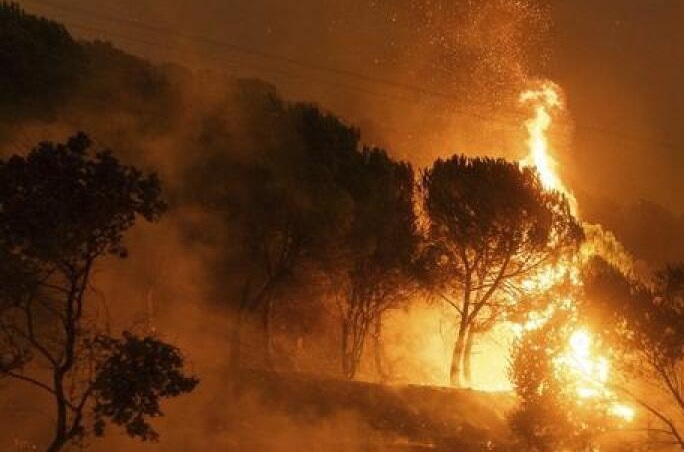11 Dec 2024

Tired Earth
By The Editorial Board

While Northern and Western Europe were more or less spared from forest fires compared to last year, the Mediterranean countries suffered massive wildfires, with Greece experiencing its worst-ever fire, which also happened to be the worst in EU history.
At the end of August, EU lawmakers thanked and congratulated the European firefighters who braved the flames in recent weeks as part of the EU’s Rescue Mechanism, which was activated seven times over the summer.
Megafires, more frequent and more spread out
At the meeting, organised by the European Parliament’s Agriculture and Rural Development (AGRI) Committee, MEPs also called for more resources at the EU level to fight wildfires, despite the Commission’s announcement this summer that it would expand its fleet of Canadair aircraft.
“The European civil protection mechanism must have more resources, more financial resources”, said French far-right MEP Gilles Lebreton (ID). Others stressed the need to improve firefighters’ equipment and encourage voluntary work.
But in addition to fire-fighting resources, efforts need to focus more on prevention, according to the European Forest Fire Information System (EFFIS) representative, who came to present and analyse the latest figures from the Observatory.
“It is not a lack of resources. The intensity of the fires is about ten times greater than what can be fought from the air,” said Jesús San-Miguel-Ayanz, head of EFFIS.
Now we are talking about more powerful ‘mega fires’, which are more frequent and spread throughout the year.
According to the European Earth Observatory Copernicus, there will be more fires in 2023 than on average between 2006 and 2022. And they are likely to increase in the future.
What about forest management?
Faced with this situation, MEPs took turns calling on the European Commission to step up prevention.
“90% of the EU budget is spent on fighting fires, while only 10% is spent on prevention. This has to change,” said German MEP Anna Deparnay-Grunenberg (Greens/EFA).
On 27 July, the European Commission published guidelines for improving the sustainable management of forests based on the EU’s Biodiversity Strategy 2030. These guidelines aim to manage forests “closer to nature” by encouraging a greater diversity of forest species to enhance their resilience and adaptation to climate change.
But this is “not enough,” according to Lebreton and many of his colleagues. “We have to go further” and, in particular, draw inspiration from the French law passed on 10 July in response to last year’s wildfires, he said.
French law requires landowners to clear their forests of undergrowth and gives local authorities the right to pre-empt land if it is not managed correctly.
For European scientists, forest management is an “essential” issue. Limiting the outbreak and spread of fires means reducing the amount of fuel or organic matter on the ground by clearing land and creating space for emergency services to move around the forest.
The MEPs also insisted on including new, more resistant species, while the Greens pointed the finger at “productive forestry”, or monocultures of highly flammable species.
“In Portugal and Spain, a lot of eucalyptus has been planted very quickly for productivity reasons, and this only exacerbates the problem,” said German MEP Martin Häusling (Greens/EFA).
For French Renew MEP Irène Tolleret, livestock farmers have an important role in this prevention: grazing reduces scrub, and animal droppings limit the spread of fire. “Farmers are at the forefront of prevention,” stresses the French MEP.
Awareness-raising
“We need to strike a balance. Clearly, 90% of the budget cannot be spent on prevention, but more needs to be done in this area. And one of the main points here is awareness-raising,” San-Miguel-Ayanz insists.
According to EFFI, 96% of fires are started by people, of which half are caused by arson and half by negligence.
Awareness campaigns are aimed at professionals such as farmers, forest managers, and the general public.
French law, for example, increases penalties for arsonists and bans smoking in and within 200 metres of forests. A National Resilience Day has also been set for 13 October to raise awareness of the risks of natural disasters, with the first edition taking place last year.
For San-Miguel-Ayanz, “people need to know that the fire risk is critical, extreme, that they cannot have barbecues, throw cigarettes, light fires in nature because these are the causes of the fires that we know about”.
The European FirEUrisk project (2021-2025) is currently working on awareness-raising and prevention at the European and regional levels, bringing together researchers, experts and the general public to reduce the risks associated with fires. The EU has allocated a budget of €10 million as part of the Horizon 2020 research programme.
“We were in Catalonia this summer and saw small landowners not looking after their forests. Prevention has started under Horizon 2020, but we need to do much more and in a more comprehensive way,” insists MEP Ulrike Müller (Renew).
Source : euractiv.com
Comment